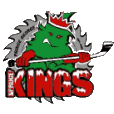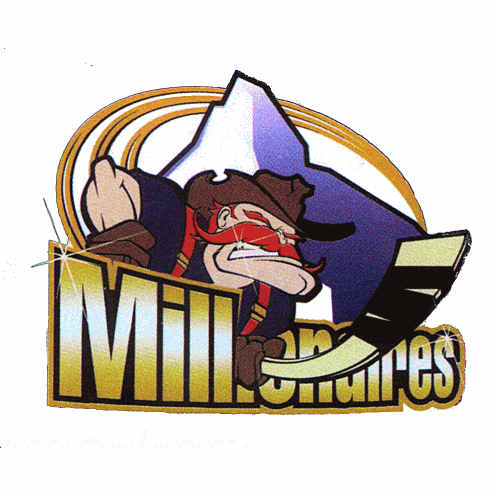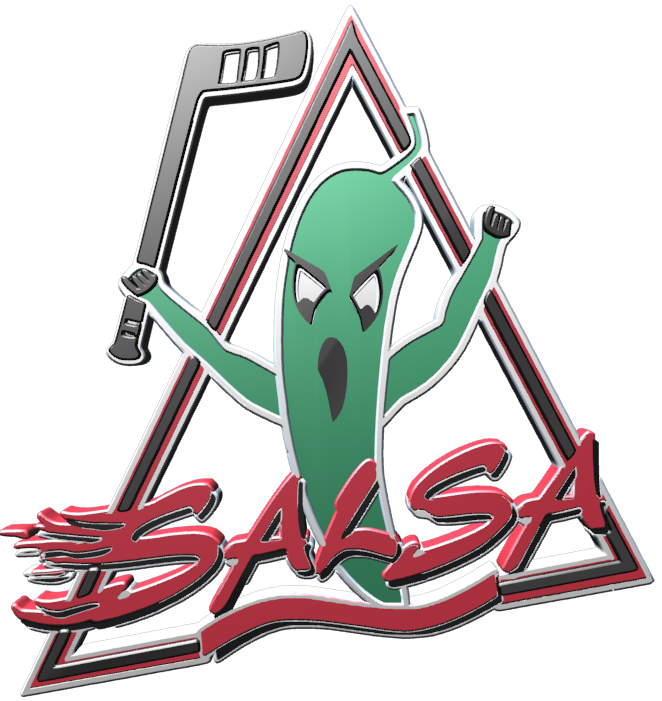BRITISH COLUMBIA HOCKEY LEAGUE - 1990'S
League Years 1990's
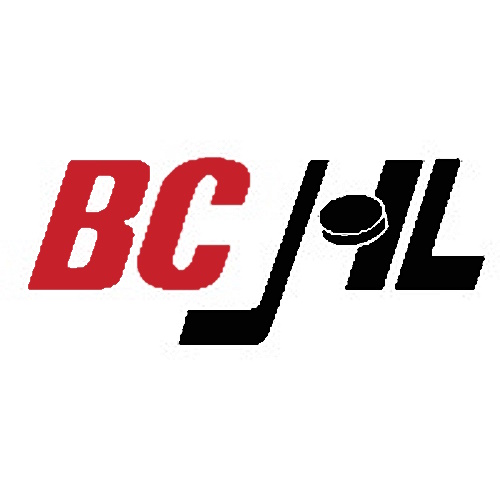
The British Columbia Junior Hockey League became known as the British Columbia Hockey League in 1996.
The League seemed to stabilize, some what, in the 1990's, after two decades of endless expansion, contraction and team relocation. The 90's saw four teams leave the league, seven were added and six relocated.
The League proved to be "a power to be reckoned with" at the regional level and especially at the national level in the 1990's. It received ten provincial titles, Mowat Cups, eight British Columbia versus Alberta titles, Doyle Cups, five Western Canadian titles, Abbott Cups and nine National Championship appearances which includes three Centennial Cups and three Royal Bank Cups (National Championship).
The Leagues third to eighth National titles were won by the Vernon Lakers, 1990 & 1991, Kelowna Spartans,1993, Vernon Vipers, 1996 & 1999 and the South Surrey Eagles in 1998.
The League also hosted the National Championship Tournament, for the first time, in 1990 by the Vernon Lakers and again in 1998 by the Naniamo Clippers.
The Next One
In 1990, a 16-year-old Vancouver-born player named Paul Kariya made his debut with the Penticton Panthers. From day one, it was clear that Kariya possessed an inordinate amount of talent and he was set on proving that every chance he got. As a rookie in the BCJHL as it was known at the time, he led his team in scoring and tied for sixth overall in the league with 112 points in 54 games.
It didn't take long for the rest of the hockey world notice there was a special talent plying his trade in the league. That year, Kariya got the invite to play for Team Canada at the Under-18s and led the country in points with 12 in five games at the tournament.
Pat Hodgins is sixth all time in BCHL scoring and was playing his fifth and final season in the league for the Victoria Warriors during Kariya's rookie campaign. He got the chance to play against him on numerous occasions that year and he recalls recognizing what a special player he was even at that young age. "He was head and shoulders the most talented kid in the league, without question." said Hodgins. "It was a pleasure to play against him. It was hard to play against him. He was that good."
"We played against each other in Victoria. During the game, he got his 100th point, so we faced off and I said congratulations and he said thanks. Later in the game, I got my 100th point and he said congratulations and I said "well thanks, but you're 16 and I'm 20."
With a year of junior hockey experience under his belt, Kariya enjoyed even more success in his second season in the league, finishing second in league scoring with 132 points 41 games. He once again got to show his skills on the international stage that year, representing Canada at the IIHF World Junior Championship as a 17-year-old.
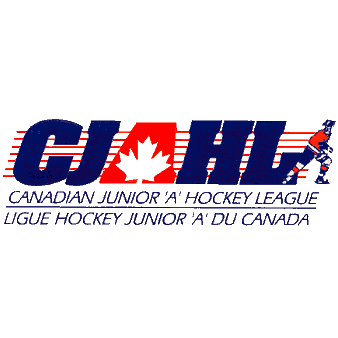
A Decade of Dominance
We finished off the '80s with back-to-back championships in Vernon and that theme carried all the way through the following decade. The Vernon Lakers made it four in five years by winning the 1991 and 1992 titles to cement their legacy as a true dynasty.
The team's head coach for three of those seasons was Ed Johstone, who also played for Vernon back in the early 1970s. He remembers a team that used its versatility to get the job done.
"We played you hard," said Johnstone. "We could play any way you wanted to play. If you wanted to skate and play a wide-open game, we could do that. If you wanted to bang and crash, we could do that as well." "If the players were told to do something and they didn't think it was right, they would ask questions. They took that to heart and we were successful."
Vernon changed its name to the Vipers to start the 1995-96 campaign, but they kept the winning tradition going, taking the league championship that same year as well as a fourth time in the decade in 1999. The Kelowna Spartans also enjoyed success in the early part of the '90s, winning the Fred Page Cup in back-to-back years in 1993 and 1994 before ultimately ceasing operations a year later.
Another powerhouse was brewing in the second half of the decade in South Surrey. The Eagles won their first championship in team history in 1997, led by the scoring prowess of Shane Kuss and future NHLer Scott Gomez. They would win a second title the following year and that team would eventually be inducted into the BC Hockey Hall of Fame over 20 years later.
Other champions in the decade include first-time winners the New Westminster Royals in 1990 and the Chilliwack Chiefs in 1995.
B.C. teams dominated on the national stage as well with six of 10 winners coming from the BCHL in the '90s. The Lakers won the Centennial Cup two years in a row to start the decade, then it was the Kelowna Spartans in '93, the Vipers in '96, the South Surrey Eagles in '98 and finally the Vipers again to close things out in '99.
This would prove to be the most successful era the league would enjoy at the National Championship tournament.
An All-Time Great
Although he never played in the NHL like many of the great BCHL players from the past, one of the best and most important players in league history is former South Surrey Eagle Shane Kuss. The diminutive forward shredded team defences for four years from 1993 to 1997 and, after registering three straight seasons of over 100 points, holds the league record for points in a career with 418 in 238 games, over 40 more than the next closest. A setup man at heart, he also holds the record for most assists in a career with 282.
Kuss is humble when discussing his accomplishments in the league and is always sure to credit his teammates and others around him at the time.
"The time I spent there, the people I played with, the memories I have, it all contributes to how I feel about that record," said Kuss. "It was a lot of fun going through that. I wouldn't have been able to accomplish a lot of those numbers without good teammates and good linemates. I was fortunate enough to have those people around me that I bonded with and was able to achieve those numbers."
Kuss' first 100-point year came in his sophomore season in the league when he collected 123 points. The next year, he notched 107, but his high-water mark came in 1996-97 when he put up 140 points on 50 goals and 90 assists to lead the league in scoring for the first time.
That final season would prove to be memorable in another way as the Eagles won their first championship in franchise history.
"The year before, we were up and down and building towards it," said Kuss. "To be able to finally win and experience what it feels like to win that championship and to share that with a group of people that you worked so hard with, you battled in practice and spent so much time with, that's what you want. That's the end prize."
"It was a great time in my life. Being able to build memories and bonds in those years, you'll never forget that."
A New Direction
In 1990, with climbing attendance numbers, increased media coverage and new corporate partnerships, the BCJHL introduced its first full-time league president in Ron Boileau. Under his guidance, the league experienced stability for the first time in its existence.
In the 1980s, there were 16 franchises that relocated, but in the 10 years after he took the job, there were only four.
Even with a new guiding hand and relative quiet when it came to relocation, there were still a number of significant teams added in the '90s that remain a huge part of today's league. The Victoria Salsa began play in 1994 and are known as the Grizzlies today. The Royal City Outlaws were also introduced that same year, and after a brief two-year stint, relocated to Prince George where the Spruce Kings Junior A chapter was born.1994 also welcomed the Langley Thunder franchise. The team stayed in Langley until 2006 when it moved to West Kelowna to become the Westside Warriors, known as the West Kelowna Warriors today. The Quesnel Millionaires came along in 1996 and stayed there until 2011 when they were reborn as the Chilliwack Chiefs. Finally, the Burnaby Bulldogs entered the league in 1998 and, after four years, moved to Port Alberni to become the Alberni Valley Bulldogs of today.
One more change during the decade was the name of the league itself. In 1996, the letter J was dropped from the acronym and the league became simply known as the BC Hockey League, or the BCHL. A name that has stuck for the past 26 years. Oh, and also the league got a new logo.
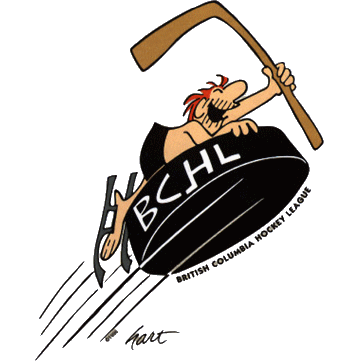
What was the deal with the caveman?
A puck.
A hockey stick.
A caveman.
As recognizable as it was unique, American comic strip artist Johnny Hart's character B.C. represented the BCHL as the official logo beginning in the mid 90s. Through a licensing agreement with Hart, the naive lead character in the comic strip B.C. found his way onto hockey jerseys, team merchandise, and almost everything BCHL during the 90's and into the new century.
While the logo was replaced during the BCHL's rebranding process in 2004, it remains as part of the league's colorful history and is a testament to the BCHL's willingness try something new and stand apart from other leagues.
It may have had nothing to do with hockey, but no one can argue the uniqueness during a time when simple lettering and shields were the norm.
It wasn't just the league who was sporting a more creative and cartoonish look - BCHL fans in the 90's saw many new logos on the front of BCHL jerseys. While teams like the Trail Smoke Eaters and Merritt Centennials maintained a connection to their original designs, some teams went in new direction.
The Prince George Spruce Kings introduced a cartoon spruce tree, complete with spinning saw blade to represent their local forest-driven economy. The Quesnel Millionaires had the cartoon Miner, a loose representation of the famed Billy Barker who made and lost his fortune during the Cariboo Gold Rush. And... who could forget the stick wielding, overly muscular Pepper of the Victoria Salsa or the big eyed, razor toothed Hornet of Langley?
While a quick scan of current BCHL logos show a distinct return to the traditional, the Caveman, the Angry Spruce Tree, and the myriad of other logos that hold their place in league history are all reminders of constant change and the evolution of the BCHL into what it is today.
Source Material: 60th Anniversary Series PDF / SmartHockey 50th Anniversary Edition PDF
1990's Highlights
In the 1990's the league achieved the following.
- 10 - Mowat Cups - BC Championship
- 1990 1991 1992 1993 1994 1995 1996 1997 1998 1999
- 8 - Doyle Cups - BC vs AB Championship
- 1990 1991 1992 1993 1996 1997 1998 1999
- Runners-up: 1994 1995
- 5 - Abbott Cups - Western Canadian Championship
- 1991 1993 1997 1998 1999
- Runners-up: 1992 1996
- 3 - Centennial Cups - National Championship
- 1990 1991 1993
- Runners-up:
1994
Semi-Finalist: 1992 - 3 - Royal Bank Cups - National Championship
- 1996 1998 1999
- Runners-up: 1997
1990's Season by Season Overview
Below you will find a brief overview of the each season in the 1990's.
» 1990-91 » 1991-92 » 1992-93 » 1993-94 » 1994-95 » 1995-96 » 1996-97 » 1997-98 » 1998-99 » 1999-00
- 1990-91
- Victoria Warriors added
Delta Flyers » Powell River Paper Kings
Ladner Penguins » Bellingham Ice Hawks
Richmond Sockeyes » Chilliwack Chiefs - 60 game schedule
Coastal & Interior Divisions - Playoffs: Best-of-seven
1 vs 4, 2 vs 3 Each Division
Quarter-Finals, Semi-Finals & Final - Champion - Vernon Lakers
- 1991-92
-
New Westminster Royal » Surrey Eagles - 60 game schedule
Coastal & Interior Divisions - Playoffs: 1 vs 4, 2 vs 3
Divisions
Quarter-Finals, Semi-Finals & Final - Champion - Vernon Lakers
- 1992-93
- 60 game schedule
Coastal & Interior Divisions - Playoffs: 1 vs 4, 2 vs 3
Divisions
Quarter-Finals, Semi-Finals & Final - Champion - Kelowna Spartans
- Victoria Warriors last season
- 1993-94
- Cowichan Valley Capitals added
- 60 game schedule
Coastal & Interior Divisions - Playoffs: 1 vs 4, 2 vs 3
Divisions
Quarter-Finals, Semi-Finals & Final - Champion - Kelowna Spartans
- 1994-95
- Victoria Salsa added
Langley Thunder added
Royal City Outlaws added - 60 game schedule
Island, Mainland & Interior Divisions
- Playoffs: Top 2 each Division
enter Quarter-Finals
Remaining top 4 teams play a best-of-three mini-series
Mini-series winners enter quarter-finals
Quarter-Finals, Semi-Finals & Final - Champion - Chilliwack Chiefs
- Kelowna Spartans last season
- 1995-96
- Vernon Lakers » Vernon
Vipers
Bellingham Ice Hawks » Trail Smoke Eaters
- 60 game schedule
Island, Mainland & Interior Division
- Playoffs: Top 2 each Division
enter Quarter-Finals
Remaining top 4 teams play a best-of-three mini-series
Mini-series winners enter quarter-finals
Quarter-Finals, Semi-Finals & Final - Champion - Vernon Vipers
- 1996-97
- Quesnel Millionaires added
Surrey Eagles » South Surrey Eagles
Royal City Outlaws » Prince George Spruce Kings - 60 game schedule
Coastal Division & Interior Division
- Playoffs: Top 3 each Division
enter Quarter-Finals
4th & 5th each Division play a best-of-three mini-series
Mini-series winners enter quarter-finals
Quarter-Finals, Semi-Finals highest seed play lowest seed each division
Final - Champion - South Surrey Eagles
- 1997-98
- 60 game schedule
Coastal Division & Interior Division
- Playoffs: Top 3 each Division
enter Quarter-Finals
4th & 5th each Division play a best-of-three mini-series
Mini-series winners enter quarter-finals
Quarter-Finals, Semi-Finals highest seed play lowest seed each division
Final - Champion - South Surrey Eagles
- Abbotsford Falcons last season
Summerland Buckaroos last season
- 1998-99
- Burnaby Bulldogs added
Powell River Paper Kings » Powell River Kings
Langley Thunder » Langley Hornets
- 60 game schedule
Coastal Conference - Island Division & Mainland Division
Interior Conference - Playoffs: Coastal Conference: 1 v
3 each division & 2nd vs 2nd
Remaining top seed "bye" to Quarter-Final
Interior Conference: 1 vs 4, 2 vs 3
Preliminary Round, Quarter-Finals, Semi-Finals, Final - Champion - Vernon Vipers
- 1999-00
- 60 game schedule
Coastal Conference - Island Division & Mainland Division
Interior Conference - Playoffs: Coastal Conference: 1 v
3 each division & 2nd vs 2nd
Remaining top seed "bye" to Quarter-Final
Interior Conference: 1 vs 4, 2 vs 3
Preliminary Round, Quarter-Finals, Semi-Finals, Final - Champion - Chilliwack Chiefs
